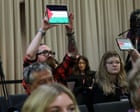
In a series of recent events, significant attention has been drawn to the Israeli-Palestinian conflict, highlighting the international community’s endeavor for peace and humanitarian support in Gaza. Amid tensions, various diplomatic and public movements have emerged, underlining the urgency of addressing the plight in the region.
At the Victorian Labor conference in Australia, members rallied to support Palestinian statehood, proposing a motion that calls for the immediate recognition of Palestine. This move aligns Australia with countries like Canada, France, and the UK that are advocating for Palestine’s sovereignty. Additionally, the conference addressed the Aukus submarine deal, though the resolution underwent modifications before it was passed.
In parallel, Australia’s Foreign Affairs Minister, Penny Wong, conducted a closed-door meeting with Israeli Ambassador Amir Maimon. The discussion, requested by the Israeli embassy, focused on Israel’s conduct in Gaza. Wong urged Israel to adhere to international law and pressed for an increase in humanitarian aid, particularly the provision of food to Palestinian civilians. This meeting underscores Australia’s diplomatic efforts to address the humanitarian crisis in Gaza.
The broader Australian public has also shown solidarity with the Palestinian cause. With the backing of a New South Wales supreme court ruling, a large-scale pro-Palestine march is set to take place across the Sydney Harbour Bridge. This demonstration, anticipated to gather up to 50,000 participants, aims to draw attention to the severe situation in Gaza, which campaigners believe necessitates immediate and significant action.
Simultaneously, on the international stage, efforts for peaceful resolutions continue. Ukrainian President Volodymyr Zelenskyy expressed readiness to engage in direct negotiations with Russian President Vladimir Putin following Putin’s apparent support for peace talks. President Zelenskyy emphasized the need to ascertain the sincerity of Russia’s intentions, advocating for leader-level discussions to expedite the peace process.
In a display of support for humanitarian issues, Steve Witkoff, the U.S. envoy to the Middle East, visited the Hostages’ Square in Tel Aviv. There, he met with the families of Israeli hostages captured by Hamas. Receiving a warm welcome, Witkoff’s visit demonstrates the U.S.’s commitment to engage with and support affected individuals, highlighting the importance of diplomatic involvement in resolving hostage situations.
The confluence of these events illustrates a tapestry of global efforts directed at achieving peace and stability through dialogue and diplomacy. From local initiatives to high-level meetings, the common thread remains an earnest pursuit of resolutions that honor international cooperation and humanitarian principles. As the world looks on, continued advocacy and diplomatic endeavors are essential in fostering a hopeful and peaceful future for affected regions. This landscape of engagement reinforces the belief that through collective action, meaningful change is attainable.
Source: {link}
